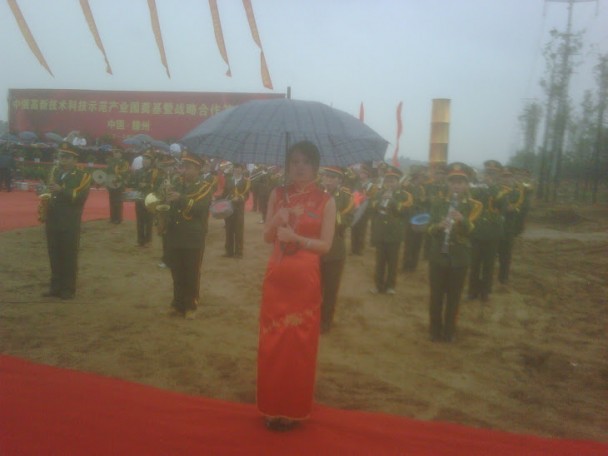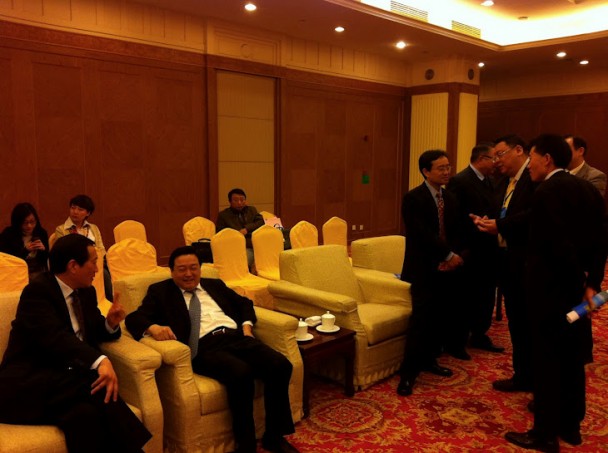In mid 2010, I booked a one-way flight to China to learn more about things work over there. Motto: Embrace, don’t compete. I ended up spending much of 2010 and 2011 in various parts of China, getting involved with the government in creating a “green energy tech park” in the hometown of President Hu and teaming up with a Chinese entrepreneur to start a new grid storage business. For the latter, we received funding from one of the top Chinese investors. (And that one, within 24 hrs of signing the initial term sheet, got us in front of a regional secretary who gave us land, loan, facility, and an initial customer.)



Much like Silicon Valley has an ecosystem for successful Internet startups, I experienced China having an ecosystem for successful greentech companies. Ecosystems are about many elements but they tend to be finely tuned and subtle yet the whole can reach amazing effectiveness. One general aspect to the China ecosystem is competent government officials, carefully filtered over the years in their effectiveness of knowing how to get things done. (The untold story behind the Solyndra disaster in the U.S. is that it’s 24-year-olds who worked through these government decisions…) Usually engineers by training, in China, many of the very brightest graduates go into government each year. I have had conversations with senior government officials about greentech manufacturing that few Silicon Valley investors are capable of holding. That’s no surprise in a sense: they live and breathe that stuff over there. Furthermore, the government officials have serious budgets and spending capability.
Then there exists a decisive commitment to green energy in China. I found the overwhelming motivation for this in a deeply engrained fear of resource scarcity (rooted in the national trauma of the bitter years), more than a “green” motivation. (Basically, when the Saudis find another oil field, American politicians think “great, we’ll be able to buy more oil from there” — while the Chinese officials think “so what, it’s their oil not ours; we still need to figure out how to get our own energy to take care of our people”.) The commitment to green energy is implemented very clearly at every level of governance. For example, at one point, one senior regional party secretary sat down with me and took an hour with me to go through his 5-year plan, underlining every word where he saw I’d be able to help him with on green energy. Underlines everywhere. This was a senior officer who knew very desperately: No green milestones met, no further promotion. And while in a secondary city, he had a $1B budget to do things with.
Another aspect is of course the presence of a well-oiled, deep, and flexible supply chain. Even as wages increase to Western levels in China, the existence of this will make China continue to be the preferred location for making things.


Meeting with senior gov officials. Agreement on the creation of a 1000-acres “green energy park”. By receiving land from the local government, one can then turn around and obtain a sizable loan from a state bank that is secured against the assessed value of that land. Local government, assessors, and banks work very efficiently with each other and the process is very streamlined. The legal documentation for sizable loans is perhaps 1/100th in size of what it would be in the U.S.
Furthermore, the local government takes responsibility for delivering building and utility infrastructure to one’s spec. At Nanosolar, I once had to pay $10m of our precious equity dollars for basic utility upgrades in our California factory. In our European factory, we managed to cover 50% of such expenses through EU subsidies. In China, one gets that for free, and the government even takes over a lot of the project management.

 Left: Our Shanghai area battery factory in a secondary city with approx 7 million residents. Workers’ dormitory included. Fish pond too.
Left: Our Shanghai area battery factory in a secondary city with approx 7 million residents. Workers’ dormitory included. Fish pond too.
Right: On the morning of meeting with one of China’s top-top officials in Beijing. The entire leadership from our factory’s city went on a 14-hr train ride in support of this meeting in the capital. No display of fireworks on that occasion — but a neat convoy of 16 government limousines — all high-end Audis — with those very special license plates that make any Chinese gasp in awe and call home. (A by-stander did.)


Meeting with a regional Party Secretary near Inner Mongolia. Surveying a 30-sqm site for building a large solar power plant.
Government officials are very decisive in China. At one point during our survey, I noticed some people living in huts on the acreage they showed us. That led to some shouting in Chinese in a meeting the same day after which a translator confronted me, saying “If you desire, the Secretary will now give orders to resettle the people you saw. It’s your call.” Well, after further inquiry, I figured out that these are 40,000 people in a village and given the early stage of the project, I looked for a graceful way not to be responsible for evicting 40,000 people. But I have no doubt that they were serious about doing so.
The government nexus has its challenging aspects too in China. Unlike in Silicon Valley, state supported investments tend to require a “real downside” on the part of the entrepreneur in the event of failure (beyond anything practiced or legal in the United States). Perhaps because failure is not an option, one can find relatively many businesses in zombie existence as well. Then while legal documentation is refreshingly light in China, the flip side of that is a constant dialogue necessary with the government to make sure one is still within the spirit of the understanding. It takes a highly skilled FTE to do that.
Not being a politician, my world view is based on a model of global collaborative value-add more than national boundaries. I see China as a ready customer for innovation produced elsewhere and enabling the roll-out of that innovation at scale. Chinese are highly receptive to foreign innovation and ready to help bring it to scale. The analogy is that without Cisco or Google, startup innovation in these respective industries would be much less investible and look much thinner. In greentech, there’s no Cisco or Google which can provide some level of fail-soft for innovation. But there’s China.
Given the geographic distance and the disparities of culture and language, it is certainly easy for misconceptions to get in between the collaborative opportunities that exist, and they do to a larger extent than necessary. Curiously, a whole number of “idiosyncracies” in China tend to remind me of things I’m familiar with from European culture — the disconnect between American and Chinese culture is probably bigger than that between European and Chinese. For one, the typical Chinese manufacturer is very accustomed to collaboratively working with European tool suppliers, and they have done so for a few decades before Nixon visited China. If the U.S. does not stay relevant to China, China will just strengthen bilateral relationships that already exists very strongly with other countries — something not all that visible in the U.S.
Along the lines of bridging misconceptions, a few words on environmental regulation and intellectual property protection based on my own experience:
While some may view environmental regulation as tough in California, I found it distinctly tougher in China. Past reputation is not necessarily existing practice — my recent direct experience is that oversight is very strict. With a ‘real downside’ for those who make a mistake on that, very unlike in the U.S. The key difference is between following rules and “shit happening”. The former one makes sure about anywhere but the latter can still happen. In our factories in California and Berlin, we never really had to sweat over environmental compliance because the rules are clear and lack of negligence is the standard applied. But in China the ‘real downside’ on accidents happening is very clear and can lead to dramatic pain. Combine this with the fact that Chinese law does not recognize corporations as a purely abstract person but always requires a human legal representative as an anchor for every corporate entity, and you have a different level of consequences.
As for IP, many fault China on that. Many of these same people have not cared to file a single patent ever in China. So first of all, if you want your intellectual property to be worth something in China, you have to file for patent protection over there. That’s true for any place on earth; patent protection only applies in the regions you filed for it. It surely costs a lot to cover the world, and I have made mistakes on that in the past as well. It’s part of what’s broken with the patent system. But that’s unrelated to China. Secondly, my (not-so-joking) joke is that there’s one place on earth that’s worse than China in terms of intellectual property protection — and that’s Silicon Valley. In Silicon Valley, you have engineers leaving a company and an investor right there ready to fund them to create a competing startup right next door. VCs do so routinely. They pick up ideas in board meetings of one company and the next week have funded a company based on that. I’m actually not complaining about that; I’m just saying don’t unfairly single out China. (As far as I’m concerned, the whole patent system is a net negative on innovation, and we would do better without it.) Then also, when violations happen, fixing them is rather effective in China. If you have a government relationship in particular, one can enforce rights very efficiently. If there’s someone stealing your tradesecrets and starting a competitor in the same province, with the right phone call, one can visit the guys in jail the next day. In the U.S., if there’s a violation, it’s the lawyers making money for the next four years and then you settle and have a grown-up competitor.
While I’m back based in San Francisco now, I love the pace and energy in China and continue to be on the board of one China based company and involved in various China activities, in particular also in the Internet space.
Pingback: exterminators